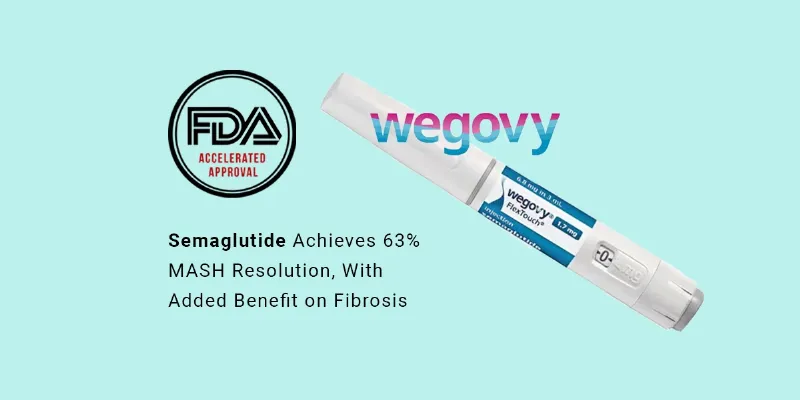FDA Grants Accelerated Approval to Semaglutide for MASH with Liver Fibrosis

The FDA has granted accelerated approval to semaglutide for treatment of MASH with moderate-to-advanced fibrosis. In the ESSENCE trial, 63% of patients achieved MASH resolution without fibrosis worsening versus 34% on placebo, while 37% showed fibrosis improvement versus 22% on placebo—marking a pivotal advance in liver disease therapeutics.
The U.S. Food and Drug Administration (FDA) has granted accelerated approval to Novo Nordisk’s Semaglutide (Wegovy®) for the treatment of metabolic dysfunction-associated steatohepatitis (MASH) with moderate-to-advanced liver fibrosis, marking the first drug specifically authorized for this fast-rising liver disease.
A New Chapter in Liver Disease Care
MASH, formerly known as nonalcoholic steatohepatitis (NASH), is an aggressive form of fatty liver disease characterized by fat accumulation, inflammation, and scarring of the liver. It affects an estimated 6% of U.S. adults—nearly 15 million people—and is closely tied to obesity, type 2 diabetes, and other metabolic disorders. Left unchecked, it can progress to cirrhosis, liver cancer, or even necessitate transplantation.
Until now, clinicians had no FDA-approved pharmacological therapy for MASH, relying solely on lifestyle modification and management of comorbidities. The decision to extend Wegovy’s label marks a turning point for hepatology and metabolic medicine.
"Today's decision by the FDA reflects the continued progress in how we understand and treat patients with MASH, bringing us closer to care that meets the needs of people living with this disease," said Dr. Arun Sanyal, Director, Stravitz-Sanyal Institute at Virginia Commonwealth University. “If left untreated, MASH can lead to serious and potentially fatal outcomes. The clinical evidence seen in ESSENCE underscores the promise of this approach to treating adults with MASH with moderate to advanced liver fibrosis.”
The ESSENCE Trial: Pivotal Evidence
The approval rests on interim results from the ongoing phase 3 ESSENCE trial, which enrolled 800 patients with biopsy-confirmed MASH and stage F2–F3 fibrosis. Participants received either once-weekly Semaglutide (2.4 mg) or placebo, alongside dietary counseling and physical activity.
At 72 weeks, results were striking:
- MASH resolution without worsening fibrosis was achieved in 63% of patients on Semaglutide, compared to 34% on placebo.
- Improvement in fibrosis without worsening MASH occurred in 37% of Semaglutide patients versus 22% of controls.
- Both endpoints together—resolution of MASH and improvement in fibrosis—were met by 33% of Wegovy patients, compared to 16% of those on placebo.
These histological improvements represent surrogate endpoints under the FDA’s accelerated approval pathway. The study will continue to 240 weeks to confirm whether reductions in inflammation and fibrosis translate into fewer liver-related deaths, transplants, or cases of decompensation.
A Drug with Broad Metabolic Reach
Semaglutide is a glucagon-like peptide-1 receptor agonist (GLP-1 RA) originally approved for type 2 diabetes and later for obesity and cardiovascular risk reduction. Its benefits extend beyond weight loss, with growing evidence that GLP-1 RAs improve metabolic health at multiple levels—including reductions in blood glucose, cholesterol, and systemic inflammation.
"The FDA's marks a truly pivotal milestone and a significant step forward for the MASH community and those seeking new options. This builds on the expanding body of evidence demonstrating the clinical benefits of semaglutide across a range of chronic conditions including diabetes, obesity, cardiovascular and chronic kidney disease,” said Dave Moore, executive vice president of U.S. Operations at Novo Nordisk.
The drug already carries approvals to reduce cardiovascular events in adults with obesity or overweight and established heart disease, and to treat obesity in both adults and adolescents. With the MASH indication, semaglutide becomes the first therapy to bridge endocrinology, cardiology, and hepatology in a single agent.
Safety and Clinical Use
The safety profile in MASH mirrors that seen in prior semaglutide programs. The most common adverse events include gastrointestinal symptoms such as nausea, vomiting, diarrhea, and constipation, typically during dose escalation. More serious risks include hypoglycemia in people with type 2 diabetes, and contraindications remain for patients with a history of medullary thyroid cancer or multiple endocrine neoplasia type 2.
Notably, 83% of trial participants tolerated and maintained the full 2.4 mg dose through week 72—an encouraging sign for long-term use in a patient group that often faces polypharmacy. The ESSENCE trial will provide definitive answers about long-term survival and disease progression. Meanwhile, Novo Nordisk has already submitted applications in Europe and Japan, suggesting global momentum in addressing this underrecognized condition.











Comments
No Comments Yet!